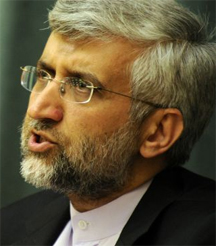ALEPPO, Syria (Reuters) – Iran has offered support to Syria’s President Bashar al-Assad as his forces tried to choke off rebels in the northern city of Aleppo.

Seeking to restore his authority after suffering the gravest setbacks so far in the 17-month-old uprising, culminating in the defection of his prime minister on Mon-day, Assad was shown on television on Tuesday meeting a senior official from his key regional ally.
It was the first footage broadcast of the 46-year-old leader for two weeks, and came a day after Syria’s new caretaker prime minister was televised chairing a hastily called cabinet session, possibly to rebut reports that other ministers had deserted along with premier Riyad Hijab.
Saeed Jalili, head of Iran’s Supreme National Security Council, said Iran would not let its close partnership with the Syrian leadership to be shaken by the uprising or external foes.
“Iran will not allow the axis of resistance, of which it considers Syria to be an essential part, to be broken in any way,” Syrian television quoted Jalili as saying.
The “axis of resistance” refers to Shi’ite Iran’s anti-Israel alliance with Syria’s rulers – from the Alawite faith which is an offshoot of Shi’ite Islam – and the Lebanese Shi’ite militant group Hezbollah, which fought a month-long war with Israel in 2006, with Iranian and Syrian support.
Damascus and Tehran have held Sunni Muslim Gulf Arab states and Turkey, all allies of the United States and European powers, responsible for the bloodshed in Syria by supporting the overwhelmingly Sunni Muslim rebels. Western powers sympathetic to the rebels are concerned that anti-Western Sunni Islamists could benefit from a victory for the anti-Assad forces.
Iran’s Fars news agency said Jalili told Assad that Iran was prepared to provide humanitarian aid to Syria.
On a fence-mending visit to Turkey, Iranian Foreign Minister Ali Akbar Salehi said he wanted to work with Ankara to resolve the crisis. Turkish Prime Minister Tayyip Erdogan described as “worrying” a comment on Monday by Tehran’s top general, who blamed Turkey, Saudi Arabia and Qatar for bloodshed in Syria.
Iran has expressed fears for more than 40 Iranians it says are religious pilgrims kidnapped by rebels from a bus in Damascus while visiting Shi’ite shrines. Salehi wrote to U.N. Secretary-General Ban Ki-moon seeking his help to free them.
Rebels say they suspect the captives were troops sent to help Assad. A rebel spokesman in the Damascus area said on Monday three of the Iranians had been killed by government shelling. He initially said the rest would be executed if the shelling did not stop but later said they were being questioned.
US Secretary of State Hillary Clinton, without naming Iran or Sunni powers, warned against a descent into “sectarian warfare” and said Washington would not tolerate “sending in proxies or terrorist fighters” to “exploit” Syria’s conflict.
In Aleppo, rebels trying to fight off an army offensive said they were running low on ammunition as Assad’s forces tried to encircle their stronghold in the southern approaches to the country’s biggest city.
Assad has reinforced his troops in preparation for an assault to recapture rebel-held districts of Aleppo after repelling fighters from most of Damascus.
“The Syrian army is trying to encircle us from two sides of Salaheddine,” said Sheikh Tawfiq, one of the rebel commanders, referring to the southwestern Aleppo neighbourhood which has seen heavy fighting over the last week.




